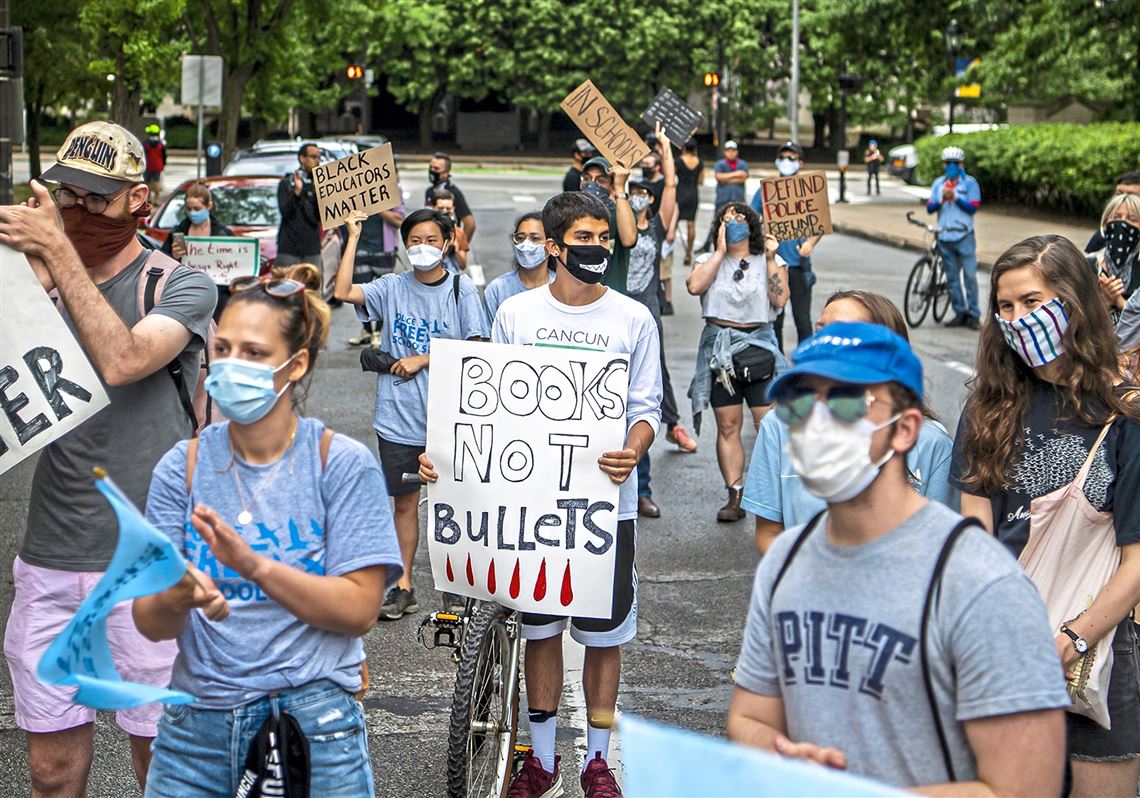Pittsburgh school police defend their jobs

Pittsburgh PA June 25 2020
Numerous Pittsburgh Public Schools police officers defended their jobs in written testimony that was read before the school board Tuesday amid calls to remove law enforcement from the district.
The officers’ statements were read aloud during the second day of a public hearing in which board members heard comments from nearly 250 people, many on the topic of whether police should be removed from city schools.
Officers told the board about times they caught students trying to bring weapons and drugs into schools, provided first aid, and stopped armed adults attempting to intrude. They also spoke about the positive relationships they have built with students over the years.
“I come to work every day looking forward to seeing our students, and it gives us joy to see them succeed,” said Officer Sonya Twyman. “When students have a rough day, they request to talk to us because we have a rapport with them and their families. A majority of the time, those talks change the tone and atmosphere for our students to continue the day on a positive note.”
The discussion over removing police from schools is not new but has increased in Pittsburgh and across the country after a Minneapolis police officer killed George Floyd in May. Since then, districts in several large cities — including Minneapolis, Seattle and Denver — have suspended or cut ties with police.
The public hearing stretched into an unusual second day because a coalition of organizations advocating for the removal of police from schools encouraged backers to submit statements, and dozens of community members entered testimony in support of the officers as well. Meanwhile, a large group of stakeholders from Provident Charter School also signed up to speak during the hearing because the school board will vote on whether to renew its charter Wednesday.
The coalition that wants police removed from schools points to the fact that Black students are arrested at disproportionate rates compared to white students in the district. The coalition said schools should move toward restorative justice practices, such as increased mental health and counseling services, in an effort to end the school-to-prison pipeline.
The Pittsburgh Public Schools employs 20 police officers who are not armed but have arresting powers.
Even unarmed, the school police officers said they have been able to end potential threats.
Officer Alfonso Roberts recalled an incident from a decade ago when he stopped a man with a gun from entering Pittsburgh CAPA.
“This particular incident occurred at Pittsburgh CAPA 6-12 on April 9, 2010, when I wrestled and subdued an armed intruder and detained him until my backup, school police and city police arrived,” Officer Roberts wrote. “My actions on this day averted a potential life or death situation to our students and staff.”
Officer Roberts was a school security guard when that incident occurred and later became an officer with the district. The coalition calling for the removal of police said it does not advocate for getting rid of school security.
But the officers said they are highly trained and respond to more than violent threats.
Officer Renee Maddex remembered performing the Heimlich maneuver on a choking second grader in a school cafeteria.
“Does the principal, counselors or teacher run to them? No, it was me,” Officer Maddex wrote. “I run to your child and ask if they are choking. I watch as your child’s eyes fill with fear, and they nod and grab at their neck. It was me that performed the Heimlich maneuver, it was me that had your child trembling in my arms after the object dislodged from their windpipe and they could breathe again.”
Nina Esposito-Visgitis, president of the Pittsburgh Federation of Teachers, which also represents Pittsburgh Public Schools police officers, said calls to remove police from schools are “wrongheaded and ignores the progressive and diverse safety department PPS has.”
She said the district has control over hiring, evaluations and discipline of officers. The district, she added, has control over whether the officers write citations, and officers must get approval from their supervisor before issuing a citation.
The department is also one of the most diverse police forces in the region, according to Ms. Esposito-Visgitis, More than half of the officers are women, and 40% are African American, she said.
“Our police know our students, have specialized training in de-escalation techniques and restorative practices and are a vital part of our school communities,” she wrote. “They do not carry firearms. They enhance safety in our schools by being problem solvers, risk managers and an overwhelming force for good.”
post-gazette.com



